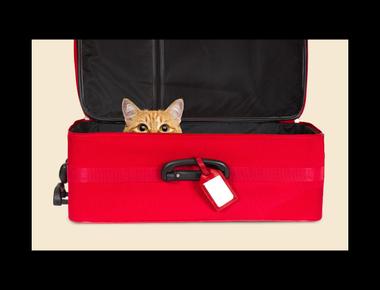

為公事而出差旅行有很多種說法
大致可以歸為三種:用 be 動詞的句型、用動詞 go 的句型,及用動詞 take 的句型
(1) 用 be 動詞的句型:
be on a business trip in 某國或都市 = be in某國或都市on business
例句:
go to某國或都市 on business / go on a business trip to 某國或都市
例句:
take a business trip to 某國或都市
例句:
要注意的是,如果是講某人在某個時間的「狀態」,該用的是 be 動詞的句型
比如你的上司這幾天不在辦公室,當有人問起他現在在哪裡、做什麼時
就該說:He is in Japan on business. / He is on a business trip in Japan.
或是有朋友要和你相約見面,但你因為出差那天將剛好不在,也是用此句型
比如:I will be in Malaysia on business. / I will be on a business trip in Malaysia.
用一般動詞 take, go 的句型,則是主動告訴別人自己(或主詞者)做了/將要做出差這件事
像是和朋友互聊近況,或是要向別人描述出差時的事情時
就會先說:
比如:
比如:
現在請大家試著用這三種句型來翻譯下列不同時態的「出差」句子,請考慮哪一種或哪幾種句型較合適:(解答在下方)
1. 我五月時會去韓國出差一星期。
2. 去年此時他在法國出差。
3. 你會去日本出差多久?
4. 我上司每年都要去美國出差好幾次。
5. 亞當明天要去印度出差。
解答:
大致可以歸為三種:用 be 動詞的句型、用動詞 go 的句型,及用動詞 take 的句型
(1) 用 be 動詞的句型:
be on a business trip in 某國或都市 = be in某國或都市on business
例句:
I was on a business trip in Japan last week.(2) 用動詞 go 的句型:
(我上周在日本出差。)
= I was in Japan on business last week.
go to某國或都市 on business / go on a business trip to 某國或都市
例句:
My boss will go to China on business next month.(3) 用動詞 take 的句型:
(我上司下個月要去中國大陸出差。)
= My boss will go on a business trip to China next month.
take a business trip to 某國或都市
例句:
When did you take a business trip to London?
(你是什麼時候去倫敦出差的?)
My father used to take a lot of business trips to Europe.
(我爸以前常去歐洲出差。)
要注意的是,如果是講某人在某個時間的「狀態」,該用的是 be 動詞的句型
比如你的上司這幾天不在辦公室,當有人問起他現在在哪裡、做什麼時
就該說:He is in Japan on business. / He is on a business trip in Japan.
或是有朋友要和你相約見面,但你因為出差那天將剛好不在,也是用此句型
比如:I will be in Malaysia on business. / I will be on a business trip in Malaysia.
用一般動詞 take, go 的句型,則是主動告訴別人自己(或主詞者)做了/將要做出差這件事
像是和朋友互聊近況,或是要向別人描述出差時的事情時
就會先說:
I took a business trip to Germany last month. The hotel I stayed at was amazing!或是要告知別人將會做出差這件事:
(我上個月去德國出差。我住的那家飯店棒呆了!)
I’m going on a business trip to New York next month. Is there anything you’d like me to get for you while I’m there?但是問人家出差多久只能用 be 動詞的句型,因為意思是他(會)在當地多久,而不是 go, take 這兩個動詞持續多久
(我下個月要去紐約出差。你有沒有想要我幫你帶回來的東西?)
比如:
How long were you in Tokyo on business? (O)同樣的,如果有提到出差的天數,也只能用 be 動詞的句型
How long did you take a business trip in Tokyo? (X)
How long did you go to Tokyo on business? (X)
How long will he be on a business trip in Paris? (O)
How long will he go on a business trip in Paris? (X)
比如:
He will be in Singapore on business for three days. (O)
He will take a business trip to Singapore for three days. (X)
現在請大家試著用這三種句型來翻譯下列不同時態的「出差」句子,請考慮哪一種或哪幾種句型較合適:(解答在下方)
1. 我五月時會去韓國出差一星期。
2. 去年此時他在法國出差。
3. 你會去日本出差多久?
4. 我上司每年都要去美國出差好幾次。
5. 亞當明天要去印度出差。
解答:
1. I will be in Korea on business for a week in May. = I will be on a business trip in Korea for a week in May.
2. He was in France on business (at) this time last year. = He was on a business trip in France (at) this time last year.
3. How long will you be in Japan on business? = How long will you be on a business trip in Japan?
4. My boss takes several business trips to the U.S. every year. = My boss goes on several business trips to the U.S. every year. = My boss goes to the U.S. on business several times a year.
5. Adam will go to India on business tomorrow. = Adam will go on a business trip to India tomorrow. = Adam will take a business trip to India tomorrow.
(註:也可將 will 換成 is going to,但此句不適合用 be 動詞的句型,因為明天出發的話,不可能明天大部份時間都「在」印度,除非是要強調亞當明天人會在何地)
重連英語 · Rewired English
想進步英文,卻沒有太多時間嗎?這不是一般的英文課程 — 它能真正改變你的大腦。透過神經可塑性訓練,即使每天只花幾分鐘,也能讓你的英文能力自�然全面提升。
成人專屬課程包含 Parkinson’s Writing™ 每日寫作法、發音訓練,以及一對一 Zoom 線上課程。從思考、表達到理解,你都會發現明顯的改變 — 少量時間,長期成效。








